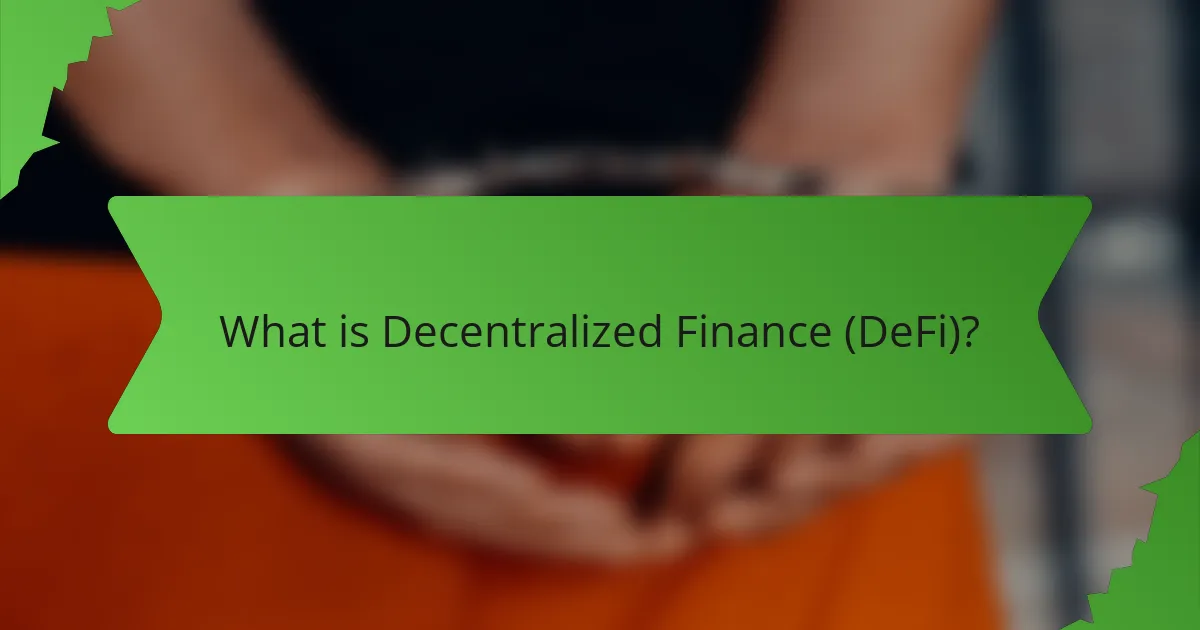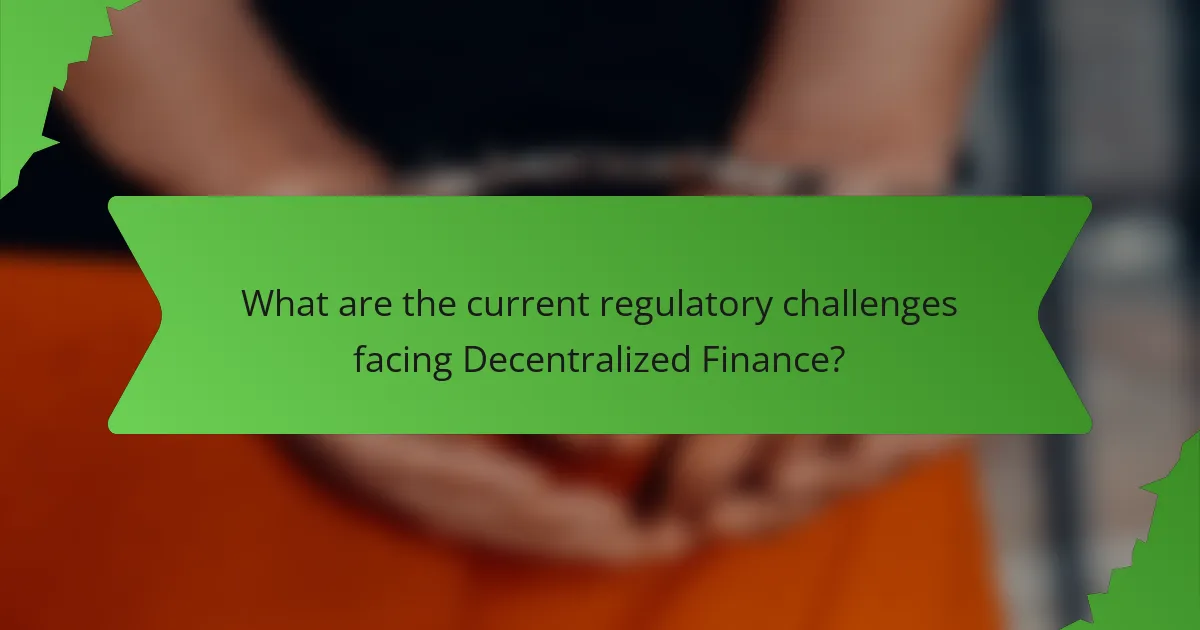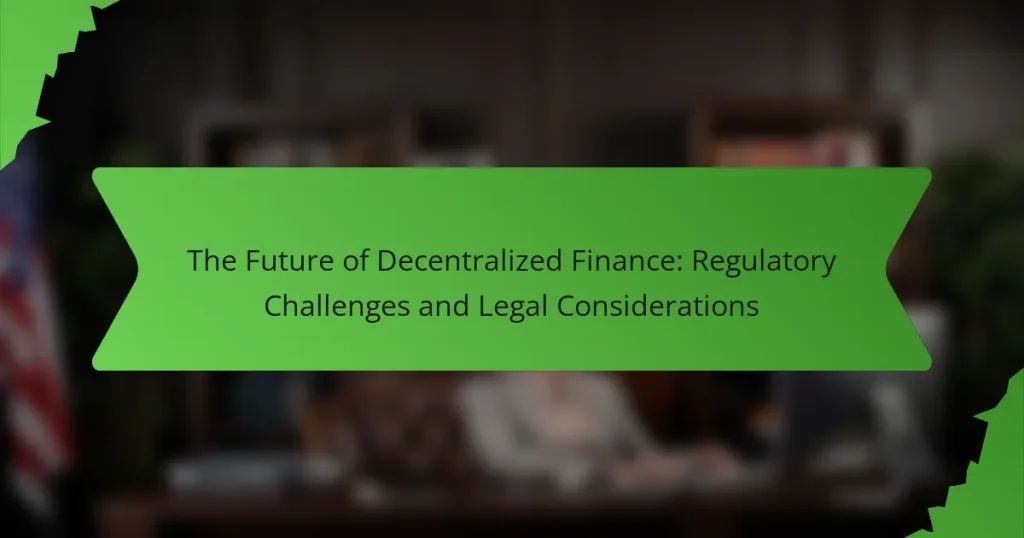Decentralized Finance (DeFi) is a financial system that operates on blockchain technology, enabling peer-to-peer transactions without central authorities. This article examines the current regulatory challenges facing DeFi, including issues related to compliance with anti-money laundering (AML) laws, investor protection, and the lack of regulatory clarity. It highlights the complexities of enforcing regulations across different jurisdictions and the implications for consumer protection and intellectual property rights. Additionally, the article addresses the need for DeFi projects to implement measures such as Know Your Customer (KYC) protocols and the impact of data privacy laws on user information management. Understanding these legal considerations is essential for the legitimacy and sustainability of DeFi in the evolving financial landscape.

What is Decentralized Finance (DeFi)?
Decentralized Finance (DeFi) refers to a financial system that operates without central authorities. It uses blockchain technology to facilitate peer-to-peer transactions. DeFi platforms enable users to lend, borrow, and trade assets directly. This system increases accessibility and reduces costs associated with traditional finance. According to a report by DeFi Pulse, total value locked in DeFi exceeded $80 billion in 2021. This growth demonstrates the increasing adoption of DeFi solutions. DeFi aims to create an open financial ecosystem for everyone. It challenges traditional banking by providing services that are typically centralized.
How does Decentralized Finance differ from traditional finance?
Decentralized Finance (DeFi) differs from traditional finance by eliminating intermediaries in financial transactions. In DeFi, transactions occur directly between users through smart contracts on blockchain networks. This contrasts with traditional finance, which relies on banks and financial institutions to facilitate transactions. DeFi offers increased accessibility, allowing anyone with internet access to participate in financial services. Traditional finance often imposes barriers such as credit checks and minimum balances. DeFi operates on a global scale, enabling cross-border transactions without the need for currency conversion. In contrast, traditional finance is often limited by national regulations and banking hours. Additionally, DeFi promotes transparency through open-source protocols, while traditional finance operates with less transparency and proprietary systems. The rapid growth of DeFi has been evidenced by the significant increase in total value locked in DeFi protocols, reaching over $80 billion in 2021.
What are the key components of the DeFi ecosystem?
The key components of the DeFi ecosystem include smart contracts, decentralized applications (dApps), and liquidity pools. Smart contracts are self-executing contracts with the terms directly written into code. They automate processes and eliminate intermediaries. Decentralized applications operate on blockchain networks, enabling peer-to-peer transactions without central authority. Liquidity pools allow users to provide assets for trading, earning fees in return. These components work together to create a decentralized financial system. The growth of DeFi has been significant, with total value locked in DeFi protocols exceeding $80 billion as of 2021, demonstrating its increasing adoption and relevance in the financial landscape.
How do smart contracts facilitate DeFi transactions?
Smart contracts automate DeFi transactions by executing predefined conditions on blockchain networks. They eliminate the need for intermediaries, reducing costs and increasing transaction speed. Smart contracts ensure transparency, as all parties can verify the terms. They also enhance security by using cryptographic techniques to prevent unauthorized access. According to a study by the World Economic Forum, smart contracts can reduce transaction costs by up to 90%. This efficiency drives the growth of decentralized finance by enabling trustless interactions. Overall, smart contracts are foundational to the functionality and scalability of DeFi ecosystems.
What are the potential benefits of Decentralized Finance?
Decentralized Finance (DeFi) offers several potential benefits. It enhances financial inclusion by providing access to financial services for unbanked populations. DeFi platforms operate without intermediaries, reducing transaction costs. Transparency is increased through blockchain technology, allowing users to verify transactions independently. Users maintain control over their assets, minimizing counterparty risk. DeFi promotes innovation in financial products, leading to diverse investment opportunities. Additionally, it enables programmable finance through smart contracts, automating processes efficiently. These benefits contribute to a more accessible and efficient financial system.
How can DeFi enhance financial inclusion?
DeFi can enhance financial inclusion by providing access to financial services without the need for traditional banking infrastructure. It allows individuals in underserved regions to participate in the global economy. DeFi platforms operate on blockchain technology, enabling peer-to-peer transactions. This eliminates intermediaries and reduces costs associated with financial services. According to a report by the World Bank, around 1.7 billion adults remain unbanked globally. DeFi can offer alternatives like lending, borrowing, and savings to these individuals. Furthermore, DeFi applications are often accessible via mobile devices, increasing usability for people in remote areas. By lowering barriers to entry, DeFi promotes equitable access to financial opportunities.
What cost savings does DeFi offer compared to traditional finance?
Decentralized Finance (DeFi) offers significant cost savings compared to traditional finance. DeFi eliminates intermediaries like banks, which reduces fees associated with transactions. Users can transact directly on blockchain networks, minimizing costs related to processing and delays. Smart contracts automate processes, further lowering operational costs. According to a report by Deloitte, DeFi can reduce transaction costs by up to 90% compared to traditional banking fees. Additionally, DeFi platforms often have lower minimum investment requirements, making financial services more accessible. Overall, these factors contribute to a more cost-effective financial ecosystem.

What are the current regulatory challenges facing Decentralized Finance?
Current regulatory challenges facing Decentralized Finance (DeFi) include lack of regulatory clarity, compliance with anti-money laundering (AML) laws, and investor protection issues. Regulatory bodies struggle to define DeFi, which complicates enforcement. Many DeFi platforms operate without clear jurisdiction, leading to varying regulations across regions. Compliance with AML laws is challenging due to the pseudonymous nature of transactions. Additionally, there are concerns about the potential for fraud and market manipulation. The Financial Action Task Force (FATF) has issued guidelines, but implementation varies globally. These challenges hinder the growth and acceptance of DeFi in traditional financial systems.
How do different jurisdictions approach DeFi regulation?
Different jurisdictions approach DeFi regulation with varying degrees of strictness and frameworks. In the United States, regulators like the SEC focus on classifying DeFi tokens as securities. This classification requires compliance with existing securities laws. The European Union, through the MiCA framework, aims to create a comprehensive regulatory environment for crypto assets, including DeFi. In contrast, jurisdictions like Switzerland have adopted a more favorable stance, promoting innovation while ensuring consumer protection. Countries such as China have taken a prohibitive approach, outright banning DeFi activities. These regulatory differences create a complex landscape for DeFi operations globally.
What are the implications of regulatory uncertainty for DeFi projects?
Regulatory uncertainty poses significant risks for DeFi projects. It can lead to increased compliance costs as projects navigate evolving legal frameworks. Uncertainty may also deter investment, as potential investors seek clarity before committing funds. Additionally, projects may face operational disruptions due to sudden regulatory changes. These disruptions can impact user trust and engagement. Historical instances, such as the SEC’s actions against various crypto entities, illustrate the potential for abrupt regulatory shifts. Consequently, the lack of clear guidelines can stifle innovation in the DeFi sector.
How can DeFi projects navigate existing financial regulations?
DeFi projects can navigate existing financial regulations by implementing compliance measures. They should conduct thorough legal assessments to understand applicable regulations. Engaging with legal experts in financial law is crucial. Projects must identify their regulatory status, such as whether they are classified as securities. Adopting Know Your Customer (KYC) and Anti-Money Laundering (AML) protocols is essential. Regular audits can help ensure adherence to regulations. Collaborating with regulators can foster a better understanding of compliance requirements. Staying updated on regulatory changes is necessary for ongoing compliance. These steps can mitigate legal risks and enhance project legitimacy.
What role do regulatory bodies play in shaping the future of DeFi?
Regulatory bodies play a critical role in shaping the future of decentralized finance (DeFi). They establish guidelines and frameworks that govern the operation of DeFi platforms. These regulations aim to protect consumers and ensure market integrity. Regulatory clarity can foster innovation by providing a secure environment for developers and users. Compliance with regulations can enhance trust in DeFi projects. For instance, the Financial Action Task Force (FATF) has issued guidelines on anti-money laundering for cryptocurrency services. Adhering to these guidelines can help DeFi projects operate legally across different jurisdictions. As regulations evolve, they may influence the design and functionality of DeFi platforms. Ultimately, regulatory bodies are key to balancing innovation with consumer protection in the DeFi space.
How can collaboration between regulators and DeFi innovators benefit the ecosystem?
Collaboration between regulators and DeFi innovators can enhance ecosystem stability and security. Regulators can provide frameworks that ensure compliance and protect users. This collaboration fosters trust among participants, encouraging wider adoption of DeFi solutions. Clear regulations can help mitigate risks associated with fraud and market manipulation.
In 2021, the Financial Action Task Force (FATF) emphasized the need for regulatory clarity in crypto markets. This clarity can lead to better innovation as developers understand compliance requirements. Additionally, joint efforts can streamline the approval process for new DeFi projects. Ultimately, this partnership can lead to a more robust and sustainable financial ecosystem.
What are the risks of overregulation in the DeFi space?
Overregulation in the DeFi space can stifle innovation and limit market participation. Excessive rules may drive developers and users away from decentralized platforms. This can reduce the diversity of projects and solutions available. Additionally, overregulation can lead to increased compliance costs for projects. These costs may deter smaller projects from entering the market. Furthermore, it can create barriers that favor established entities over new entrants. A lack of regulatory clarity can also lead to uncertainty, discouraging investment. Ultimately, overregulation risks undermining the core principles of decentralization and financial inclusivity in DeFi.

What legal considerations must DeFi projects address?
DeFi projects must address multiple legal considerations, including regulatory compliance, consumer protection, and anti-money laundering (AML) laws. Regulatory compliance involves adhering to the laws of jurisdictions in which they operate. This may include obtaining necessary licenses or registrations. Consumer protection laws ensure that users are safeguarded against fraud and misinformation.
Anti-money laundering laws require DeFi projects to implement measures to prevent illicit financial activities. These measures often include Know Your Customer (KYC) protocols. Intellectual property rights must also be considered to protect innovations. Tax obligations arise from transactions within DeFi platforms, necessitating accurate reporting.
Data privacy laws may impact how user information is collected and stored. Jurisdictional issues can complicate enforcement of laws across borders. Each of these considerations is crucial for the legitimacy and sustainability of DeFi projects.
How do intellectual property laws apply to DeFi innovations?
Intellectual property laws apply to DeFi innovations by protecting the underlying technologies and concepts. These laws can safeguard software code, algorithms, and unique processes used in decentralized finance applications. Copyright law typically covers the original code and design of DeFi platforms. Patent law may protect novel technological solutions or methods developed within the DeFi space. Trademark law can be used to protect brand names and logos associated with DeFi projects. The application of these laws ensures that creators can maintain rights over their innovations. Legal challenges may arise due to the decentralized nature of DeFi, complicating enforcement. As of now, the evolving regulatory landscape continues to shape how these laws are interpreted in relation to DeFi.
What are the legal implications of using open-source code in DeFi?
Using open-source code in DeFi can lead to various legal implications. These implications include issues related to copyright, licensing, and liability. Open-source licenses dictate how code can be used, modified, and distributed. Violating these licenses can result in legal actions from original authors. Additionally, developers may face liability for vulnerabilities in their code. This liability can extend to financial losses incurred by users. Courts may hold developers accountable under various legal frameworks. The legal landscape is evolving as regulators seek to address these challenges. Understanding these implications is crucial for developers in the DeFi space.
How can DeFi projects protect themselves from legal liabilities?
DeFi projects can protect themselves from legal liabilities by implementing robust compliance measures. This includes adhering to local regulations and ensuring transparency in operations. Projects should engage legal experts to navigate the complex regulatory landscape. Establishing clear terms of service can also minimize misunderstandings with users. Additionally, utilizing decentralized governance mechanisms can distribute decision-making and liability. Insurance solutions tailored for DeFi can provide financial protection against potential legal claims. Regular audits and assessments can identify vulnerabilities and ensure compliance. By proactively addressing these areas, DeFi projects can mitigate risks associated with legal liabilities.
What best practices should DeFi projects implement to ensure compliance?
DeFi projects should implement comprehensive compliance frameworks. These frameworks must include Know Your Customer (KYC) processes. KYC helps verify the identity of users to prevent fraud. Projects should also establish Anti-Money Laundering (AML) policies. AML policies monitor transactions for suspicious activity. Regular audits are essential for maintaining compliance. Audits assess adherence to regulatory standards. Additionally, projects should stay updated on evolving regulations. This ensures alignment with local and international laws. Collaboration with legal experts can provide necessary guidance. These practices collectively enhance regulatory compliance in DeFi.
How can DeFi projects stay informed about evolving regulations?
DeFi projects can stay informed about evolving regulations by actively monitoring regulatory bodies and industry news. Regularly reviewing updates from organizations like the Financial Action Task Force (FATF) and the Securities and Exchange Commission (SEC) is essential. Engaging with legal experts who specialize in cryptocurrency regulations provides valuable insights. Participating in industry forums and networks allows for sharing knowledge and experiences with peers. Subscribing to newsletters from regulatory and legal firms can also keep projects updated. Additionally, utilizing social media platforms for real-time information can be beneficial. These methods enable DeFi projects to adapt to regulatory changes promptly.
What resources are available for legal guidance in the DeFi space?
Legal guidance resources in the DeFi space include law firms specializing in blockchain technology. These firms provide consultations on compliance and regulatory issues. Additionally, industry associations offer guidelines and best practices. Online platforms also host legal forums for discussions on DeFi regulations. Academic research papers provide insights into evolving legal frameworks. Webinars and conferences feature legal experts discussing DeFi challenges. Government websites often publish regulatory updates relevant to DeFi. Lastly, legal blogs and publications focus on current trends and case studies in the DeFi sector.
What practical steps can DeFi projects take to prepare for regulatory changes?
DeFi projects can prepare for regulatory changes by implementing robust compliance frameworks. They should conduct thorough legal assessments to understand applicable regulations. Engaging with legal experts can provide clarity on compliance requirements. Additionally, projects should establish transparent governance structures. This can enhance accountability and trust. Regular audits can identify compliance gaps and mitigate risks. Collaborating with regulators can foster a proactive approach to compliance. Lastly, educating stakeholders on regulatory updates can ensure informed decision-making. These steps align with best practices in the evolving regulatory landscape.
The main entity of the article is Decentralized Finance (DeFi), which represents a financial system operating without central authorities, utilizing blockchain technology for peer-to-peer transactions. The article explores the regulatory challenges facing DeFi, including compliance with anti-money laundering laws and the implications of regulatory uncertainty on DeFi projects. It discusses the key components of the DeFi ecosystem, such as smart contracts and decentralized applications, and highlights the potential benefits of DeFi, including enhanced financial inclusion and cost savings over traditional finance. Additionally, the article covers legal considerations for DeFi projects, including intellectual property rights and best practices for compliance.




